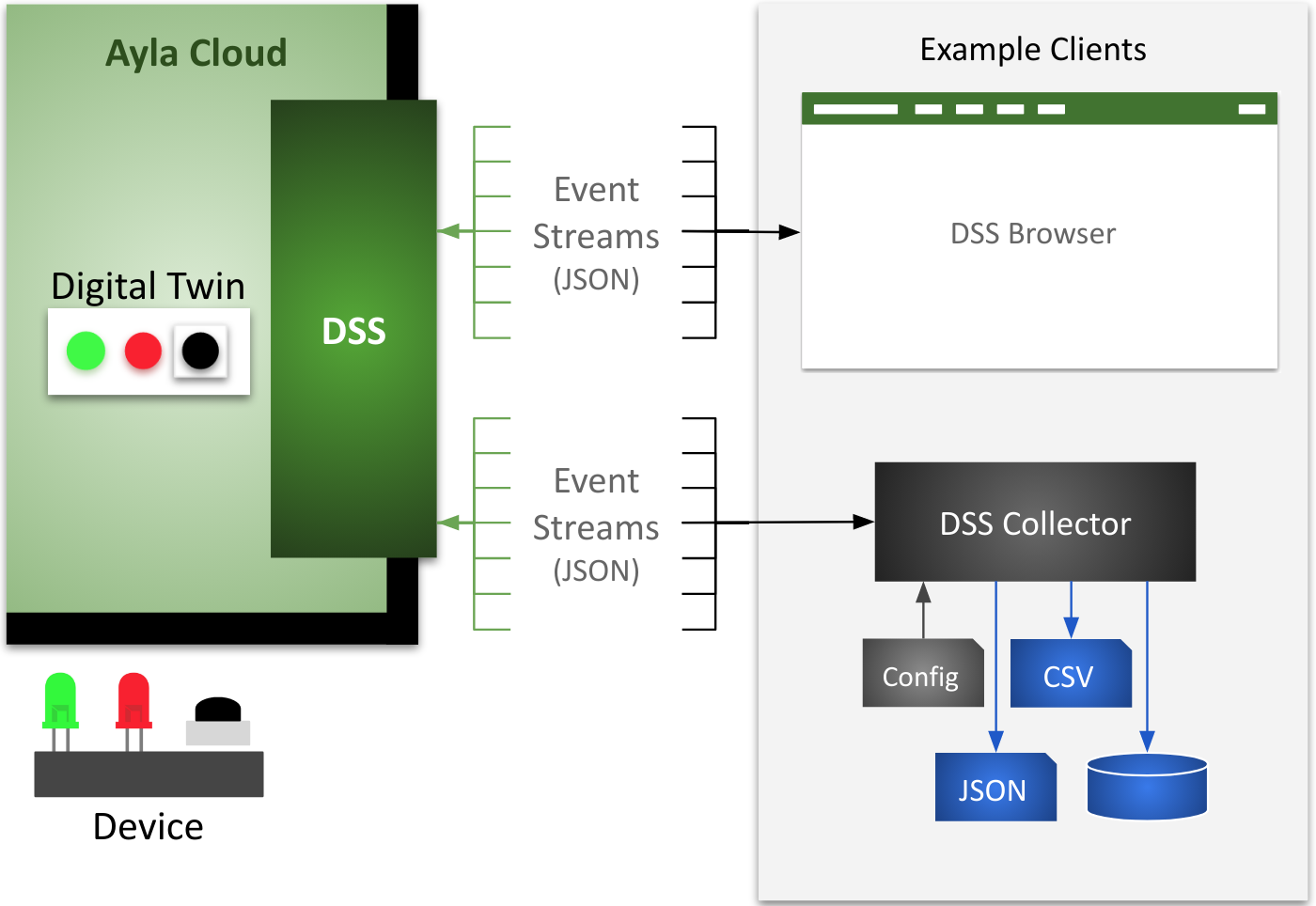Overview
Welcome, developers and integrators! This video introduces you to Ayla Cloud Services and APIs:
Each Ayla Cloud service is summarized below. You can use the API Browser to experiment with APIs, and the API Users Guide to learn how to accomplish tasks with sets of APIs.
Datastream Service
The Ayla Datastream Service (DSS) is a WebSocket server that pushes device-related event notifications (in near real-time) from the Ayla Cloud to subscribing WebSocket clients. See the diagram:

The diagram shows the following:
- An example device with a green LED, red LED, and black button.
- A digital twin in the Ayla Cloud representing the device.
- A browser-based client receiving/displaying events and sending acknowledgements.
- A Node.js DSS client receiving/persisting events and sending acks.
DSS Events
The DSS WebSocket server sends notifications of the following events to subscribed clients:
| Event | Description |
|---|---|
| connectivity | The Ayla Cloud is able/not able to interact with a registered device. |
| datapoint | A digital twin property value changed. |
| datapointack | A device-based Ayla Agent confirmed to the Ayla Cloud that a device property value changed. |
| location | A digital twin latitute/longitude value changed. |
| registration | The Ayla Cloud registered/unregistered a device. |
The JSON formats of the notifications are seen below:
Connectivity
{
"seq": "1",
"metadata": {
"oem_id": "0dfc7900",
"oem_model": "ledevb",
"dsn": "AC000W000340649",
"resource_tags": [],
"event_type": "connectivity"
},
"connection": {
"event_time": "2018-09-24T10:26:37Z",
"user_uuid": "00000000-0000-0000-0000-000000000000",
"status": "Online"
}
}
Datapoint
{
"seq": "13",
"metadata": {
"oem_id": "0dfc7900",
"oem_model": "linuxevb",
"dsn": "AC000W005606115",
"property_name": "Blue_LED",
"display_name": "Blue_LED",
"base_type": "boolean",
"resource_tags": [],
"event_type": "datapoint"
},
"datapoint": {
"id": "1ff9b91c-bfe4-11e8-1261-67d251d3ec96",
"created_at_from_device": null,
"updated_at": "2018-09-24T10:25:14Z",
"created_at": "2018-09-24T10:25:14Z",
"user_uuid": "00000000-0000-0000-0000-000000000000",
"echo": true,
"closed": false,
"value": 0,
"metadata": {}
}
}
Datapointack
{
"seq": "2",
"metadata": {
"oem_id": "0dfc7900",
"oem_model": "linuxevb",
"dsn": "AC000W005606115",
"property_name": "Blue_LED",
"display_name": "Blue_LED",
"base_type": "boolean",
"resource_tags": [],
"event_type": "datapointack"
},
"datapoint": {
"id": "15af3cfc-bfe4-11e8-f2f0-9aab1d61f636",
"created_at_from_device": null,
"updated_at": "2018-09-24T10:24:57Z",
"created_at": "2018-09-24T10:24:57Z",
"user_uuid": "00000000-0000-0000-0000-000000000000",
"echo": false,
"closed": false,
"value": 1,
"ack_message": 0,
"ack_status": 200,
"ack_id": "160c8c90-bfe4-11e8-87f4-8d732085e587",
"acked_at": "2018-09-24T10:24:57Z",
"metadata": {}
}
}
Location
{
"seq": "1",
"metadata": {
"oem_id": "0dfc7900",
"oem_model": "ledevb",
"dsn": "AC000W000340779",
"resource_tags": [],
"event_type": "location"
},
"location_event": {
"dsn": "AC000W000340779",
"ip": "67.255.234.73",
"lat": " 44.769500",
"long": "-69.428300",
"provider": "ip-based",
"user_uuid": "00000000-0000-0000-0000-000000000000",
"created_at": "2018-09-24T11:04:07Z"
}
}
Registration
{
"seq": "1",
"metadata": {
"oem_id": "0dfc7900",
"oem_model": "ledevb",
"dsn": "AC000W000340649",
"resource_tags": [],
"event_type": "registration"
},
"registration_event": {
"dsn": "AC000W000340649",
"user_uuid": null,
"registered": false,
"registration_type": "AP-Mode",
"unregistered_at": "2018-09-24T10:29:50Z"
}
}
DSS Technology
WebSockets
A WebSocket enables sustained, bidirectional communication over HTTP. Ayla DSS is a WebSocket server that sends events and heartbeats to WebSocket clients that receive the events and acknowledge the heartbeats. A Javascript client might instantiate a WebSocket in this manner:
let socket = new WebSocket(url + '?stream_key=' + key)
There are several instances of Ayla DSS throughout the world, and the url parameter indicates the appropriate instance for your region and deployment type (see Regional Domains). The key parameter specifies the subscription key. Once constructed, a WebSocket client listens for events with a set of callback functions similar to the following:
socket.onopen = function(msg){}
socket.onerror = function(msg){}
socket.onmessage = function(msg){}
socket.onclose = function(msg){}
Messages
A WebSocket onmessage function receives MessageEvent objects that encapsulate heartbeats or DSS events. A MessageEvent object might include key/value pairs similar to the following:
bubbles: false
cancelBubble: false
cancelable: false
composed: false
currentTarget: WebSocket {}
data: "1|Z"
defaultPrevented: false
eventPhase: 0
isTrusted: true
lastEventId: ""
origin: "wss://stream.aylanetworks.com"
path: []
ports: []
returnValue: true
source: null
srcElement: WebSocket {}
target: WebSocket {}
timeStamp: 192795.29999988154
type: "message"
The key/value pair of interest is data:"1|Z". The key is data. The value, "1|Z", indicates that this MessageEvent is a DSS heartbeat. If the MessageEvent had been an actual event (connectivity, datapoint, etc.), the value would have been similar to data:"481|{}". The number 481 represents the length of the JSON event string within the curly braces. The "|" is useful for splitting the string into length and event. And, the curly braces, {}, encapsulate the actual JSON event string which might look like this:
{
"seq": "13",
"metadata": {
"oem_id": "0dfc7900",
"oem_model": "linuxevb",
"dsn": "AC000W005606115",
"property_name": "Blue_LED",
"display_name": "Blue_LED",
"base_type": "boolean",
"resource_tags": [],
"event_type": "datapoint"
},
"datapoint": {
"id": "1ff9b91c-bfe4-11e8-1261-67d251d3ec96",
"created_at_from_device": null,
"updated_at": "2018-09-24T10:25:14Z",
"created_at": "2018-09-24T10:25:14Z",
"user_uuid": "00000000-0000-0000-0000-000000000000",
"echo": true,
"closed": false,
"value": 0,
"metadata": {}
}
}
Heartbeats
A DSS client onmessage function must, therefore, (1) determine if a MessageEvent is a heartbeat or a DSS event, (2) respond if it's a heartbeat, and (3) process if it's a DSS event:
socket.onmessage = function(msg) {
if(msg.data.includes('|Z')) {
stream.socket.send('Z')
}
else {
var arr = msg.data.split('|')
let event = JSON.parse(arr[1])
process(event)
}
}
Device Service
Factory Proxy Service
IoT Command Center
Message Service
Rules Service
User Service
Updated over 4 years ago
